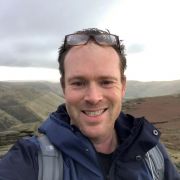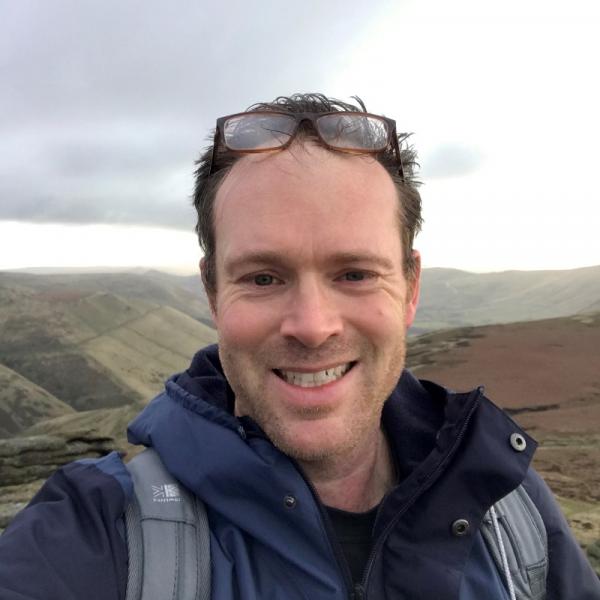Dr Iwan Robert Evans
MBiochem PhD
Clinical Medicine, School of Medicine and Population Health
Senior Lecturer


+44 114 222 3695
Full contact details
Clinical Medicine, School of Medicine and Population Health
Firth Court
Western Bank
Sheffield
S10 2TN
- Profile
-
For enquiries, please contact – ClinMed-Operational@sheffield.ac.uk
After studying Biochemistry at the University of Oxford (Somerville College), I joined the MRC’s 4-year PhD program in Molecular Cell Biology at UCL’s LMCB. During my PhD I studied the generation of cell-cell repulsion downstream of the Eph receptor family of tyrosine kinases with Prof. Kate Nobes.
To study the regulation of cell migration in vivo, I subsequently joined the laboratory of Prof. Will Wood at the University of Bath. There I investigated how the migration and inflammatory responses of macrophages are controlled using the fruit fly, Drosophila melanogaster. In 2013, I was awarded a Thomas-Berry and Simpson Fellowship by the School of Medicine & Population Health at the University of Sheffield to establish my own research group focusing on the role apoptotic cells play in regulation of macrophage function.
I was subsequently awarded a Sir Henry Dale Fellowship by Wellcome/The Royal Society, which I activated in 2014. Our lab uses fruit flies and a variety of cell lines (including primary human immune cells) to study regulation of the innate immune system.
- Research interests
-
Lay summary
Immune cells play an important role in the normal development, general upkeep and repair of our bodies, in addition to their roles defending against infection and disease. An important function of a subset of our white blood cells (called macrophages) is to detect, ingest (phagocytose) and degrade debris, dying cells and invading pathogens.
When these processes go wrong it can cause or worsen a wide range of human diseases and conditions including autoimmunity, atherosclerosis, cancer and chronic inflammation, often due to the inappropriate behaviour of the macrophages themselves. A major problem is that we do not fully understand how the function of macrophages is controlled; understanding this would enable the generation of therapies aimed at manipulating macrophage behaviour and so prevent or reduce their contribution to these damaging conditions.
Fruit flies (Drosophila) are considerably simpler than vertebrates such as ourselves, yet the key genes important in macrophage function are also present. This makes it much easier for us to study and identify new genes involved in macrophage functions such as migration, phagocytosis and degradation of ingested material.
Importantly, fruit flies contain a population of cells called hemocytes that are very similar in their function and behaviour to our own macrophages. We study these fly macrophages to understand new mechanisms by which our own immune cells may be controlled.
Contact with cells undergoing a programmed form of death (called apoptosis), which often occurs at sites of injury or pathology, is thought to alter the behaviour of macrophages. This can be helpful in some circumstances but on other occasions it may cause macrophages to contribute to disease progression.
Drosophila hemocytes display altered responses when challenged in the presence of increased levels of cell death. One key area in our lab is to use fruit flies as a model system to understand how apoptotic cells regulate macrophage function. We are also interested in understanding how engulfment of other cargoes is controlled and regulates macrophage behaviour (e.g. pathogenic bugs).
Technical summary
Drosophila hemocytes are a population of highly migratory macrophages that disperse over the entire embryo during development. They represent the cellular arm of the innate immune system in the fly and clear both apoptotic cells and pathogens - without these functions development or survival in the face of infection are strongly perturbed, respectively.
The unparalleled imaging capabilities of hemocytes within the developing embryo, coupled with the well-established and rapid genetics of Drosophila, enable the cell biology underlying macrophage function to be determined in the context of an intact organism.
Clearance of apoptotic cells is crucial for development and this process is known to alter macrophage function. Undigested apoptotic corpses within hemocytes can suppress both their general motility and inflammatory responses. Using this model system we are studying how apoptotic corpses affect macrophage behaviour at a number of stages during the process of apoptotic cell clearance.
We are particularly focused on how the stages post-engulfment can inhibit the migratory machinery of hemocytes. This mechanism could have important consequences for a wide range of human diseases, since it could contribute to the inappropriate or prolonged localisation of macrophages at the numerous sites of pathology that contain high levels of cells dying by apoptosis.
We have established a number of collaborations with groups within the Medical School and Biomedical Science at the University of Sheffield in order to translate our findings into other vertebrate systems (Zeidler, Prince and Johnston Labs).
Current Projects:
- Anti-inflammatory signalling in Drosophila macrophages.
- Impact of apoptotic cell clearance on inflammatory responses.
- Find-me cue signals in vivo.
- Blood cell proliferation and activation.
- Macrophage subtypes in health and disease.
- Publications
-
Show: Featured publications All publications
Featured publications
Journal articles
- Identification of functionally distinct macrophage subpopulations in Drosophila. Elife, 10. View this article in WRRO


- Overexposure to apoptosis via disrupted glial specification perturbs Drosophila macrophage function and reveals roles of the CNS during injury. Cell Death & Disease, 11(8). View this article in WRRO


- Simu-dependent clearance of dying cells regulates macrophage function and inflammation resolution. PLOS Biology, 17(5). View this article in WRRO


- Corpse Engulfment Generates a Molecular Memory that Primes the Macrophage Inflammatory Response. Cell, 165(7), 1658-1671. View this article in WRRO


- Draper/CED-1 Mediates an Ancient Damage Response to Control Inflammatory Blood Cell Migration In Vivo. Current Biology, 25(12), 1606-1612. View this article in WRRO


- Enabled Negatively Regulates Diaphanous-Driven Actin Dynamics In Vitro and In Vivo. Developmental Cell, 28(4), 394-408. View this article in WRRO


- Drosophila blood cell chemotaxis. Current Opinion in Cell Biology, 30, 1-8. View this article in WRRO


- Calcium flashes orchestrate the wound inflammatory response through DUOX activation and hydrogen peroxide release. Curr Biol, 23, 424-429. View this article in WRRO


- SCAR/WAVE-mediated processing of engulfed apoptotic corpses is essential for effective macrophage migration in Drosophila. Cell Death Differ, 20, 709-720. View this article in WRRO


- A dual role for the betaPS integrin myospheroid in mediating Drosophila embryonic macrophage migration. J Cell Sci, 126, 3475-3484.


- Ena drives invasive macrophage migration in Drosophila embryos. Dis Model Mech, 4, 126-134.


- Drosophila embryonic hemocytes. Curr Biol, 21, R173-R174.


- Clasp-mediated microtubule bundling regulates persistent motility and contact repulsion in Drosophila macrophages in vivo. J Cell Biol, 189, 681-689. View this article in WRRO


- Live imaging of Drosophila melanogaster embryonic hemocyte migrations. J Vis Exp. View this article in WRRO


- Prioritization of competing damage and developmental signals by migrating macrophages in the Drosophila embryo. Curr Biol, 20, 464-470.


- Interdependence of macrophage migration and ventral nerve cord development in Drosophila embryos. Development, 137, 1625-1633.


- Drosophila embryos as model systems for monitoring bacterial infection in real time. PLoS Pathog, 5, e1000518. View this article in WRRO


- Genetic ablation of Drosophila phagocytes reveals their contribution to both development and resistance to bacterial infection. J Innate Immun, 1, 322-334.


All publications
Journal articles
- Macrophage subpopulation identity in Drosophila is modulated by apoptotic cell clearance and related signalling pathways. Frontiers in Immunology, 14. View this article in WRRO


- Identification of functionally distinct macrophage subpopulations in Drosophila. Elife, 10. View this article in WRRO


- The epidermal growth factor ligand Spitz modulates macrophage efferocytosis, wound responses and migration dynamics during Drosophila embryogenesis. Frontiers in Cell and Developmental Biology, 9.


- Overexposure to apoptosis via disrupted glial specification perturbs Drosophila macrophage function and reveals roles of the CNS during injury. Cell Death & Disease, 11(8). View this article in WRRO


- Simu-dependent clearance of dying cells regulates macrophage function and inflammation resolution. PLOS Biology, 17(5). View this article in WRRO


- Ena orchestrates remodelling within the actin cytoskeleton to drive robust Drosophila macrophage chemotaxis. Journal of Cell Science, 132(5). View this article in WRRO


- Corpse Engulfment Generates a Molecular Memory that Primes the Macrophage Inflammatory Response. Cell, 165(7), 1658-1671. View this article in WRRO


- Hemotin, a Regulator of Phagocytosis Encoded by a Small ORF and Conserved across Metazoans. PLOS Biology, 14(3). View this article in WRRO


- Draper/CED-1 Mediates an Ancient Damage Response to Control Inflammatory Blood Cell Migration In Vivo. Current Biology, 25(12), 1606-1612. View this article in WRRO


- Enabled Negatively Regulates Diaphanous-Driven Actin Dynamics In Vitro and In Vivo. Developmental Cell, 28(4), 394-408. View this article in WRRO


- Drosophila blood cell chemotaxis. Current Opinion in Cell Biology, 30, 1-8. View this article in WRRO


- Calcium flashes orchestrate the wound inflammatory response through DUOX activation and hydrogen peroxide release. Curr Biol, 23, 424-429. View this article in WRRO


- SCAR/WAVE-mediated processing of engulfed apoptotic corpses is essential for effective macrophage migration in Drosophila. Cell Death Differ, 20, 709-720. View this article in WRRO


- A dual role for the betaPS integrin myospheroid in mediating Drosophila embryonic macrophage migration. J Cell Sci, 126, 3475-3484.


- Ena drives invasive macrophage migration in Drosophila embryos. Dis Model Mech, 4, 126-134.


- Drosophila embryonic hemocytes. Curr Biol, 21, R173-R174.


- Understanding in vivo blood cell migration--Drosophila hemocytes lead the way. Fly (Austin), 5, 110-114.


- Live imaging of Drosophila melanogaster embryonic hemocyte migrations.. Journal of visualized experiments : JoVE(36).


- Clasp-mediated microtubule bundling regulates persistent motility and contact repulsion in Drosophila macrophages in vivo. J Cell Biol, 189, 681-689. View this article in WRRO


- Live imaging of Drosophila melanogaster embryonic hemocyte migrations. J Vis Exp. View this article in WRRO


- Prioritization of competing damage and developmental signals by migrating macrophages in the Drosophila embryo. Curr Biol, 20, 464-470.


- Interdependence of macrophage migration and ventral nerve cord development in Drosophila embryos. Development, 137, 1625-1633.


- Investigating the molecular mechanisms underlying cellular repulsion from ephrin ligands : a potential functional role for the Ena/VASP family downstream of Eph receptors..


- Drosophila embryos as model systems for monitoring bacterial infection in real time. PLoS Pathog, 5, e1000518. View this article in WRRO


- Genetic ablation of Drosophila phagocytes reveals their contribution to both development and resistance to bacterial infection. J Innate Immun, 1, 322-334.


- Ena/VASP proteins mediate repulsion from ephrin ligands. J Cell Sci, 120, 289-298.


- Vav1 and Vav2 play different roles in macrophage migration and cytoskeletal organization. Exp Cell Res, 310, 303-310.


- ASXL3‐related disorder: Molecular phenotyping and comprehensive review providing insights into disease mechanism. Clinical Genetics.


Conference proceedings papers
- Cell migration in vivo; determining the function of Ena. MECHANISMS OF DEVELOPMENT, Vol. 126 (pp S312-S312)


Preprints
- Macrophage subpopulation identity inDrosophilais modulated by apoptotic cell clearance and related signalling pathways, Cold Spring Harbor Laboratory.


- Identification of functionally-distinct macrophage subpopulations regulated by efferocytosis in Drosophila.


- Overexposure to apoptosis via disrupted glial specification perturbs Drosophila macrophage function and reveals roles of the CNS during injury.


- Identification of functionally distinct macrophage subpopulations in Drosophila. Elife, 10. View this article in WRRO
- Research group
-
- Elliot Brooks (IICD, MRC Dimen student)
- Olivier Tardy (IICD, MRC Dimen student)
Lab Members
- Juliette Howarth, MBB masters student
- Teaching interests
-
- Use of flies in biomedical research.
- Cell biology.
- Drosophila genetics.
- Macrophages in health and disease.
- Haematopoiesis.
- Professional activities and memberships
-
- Member of the Bateson Centre, University of Sheffield.
- Fellowships and beyond network (founder and coordinator).
- Wellbeing Champion for IICD.
- Member of the British Society for Cell Biology.
- Member of the British Society for Developmental Biology.
- Member of the Genetics Society.
- Royal Society International Exchanges Grant Panel member.
- IICD Fellows rep.
- Medical School Research Day committee member.
